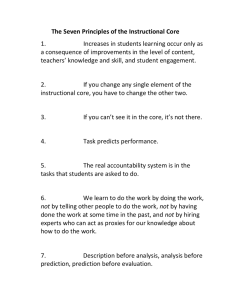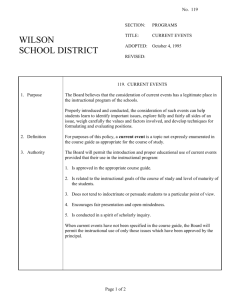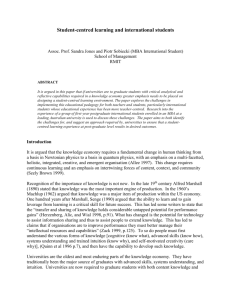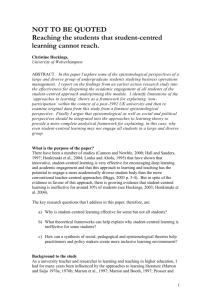Course 4
advertisement
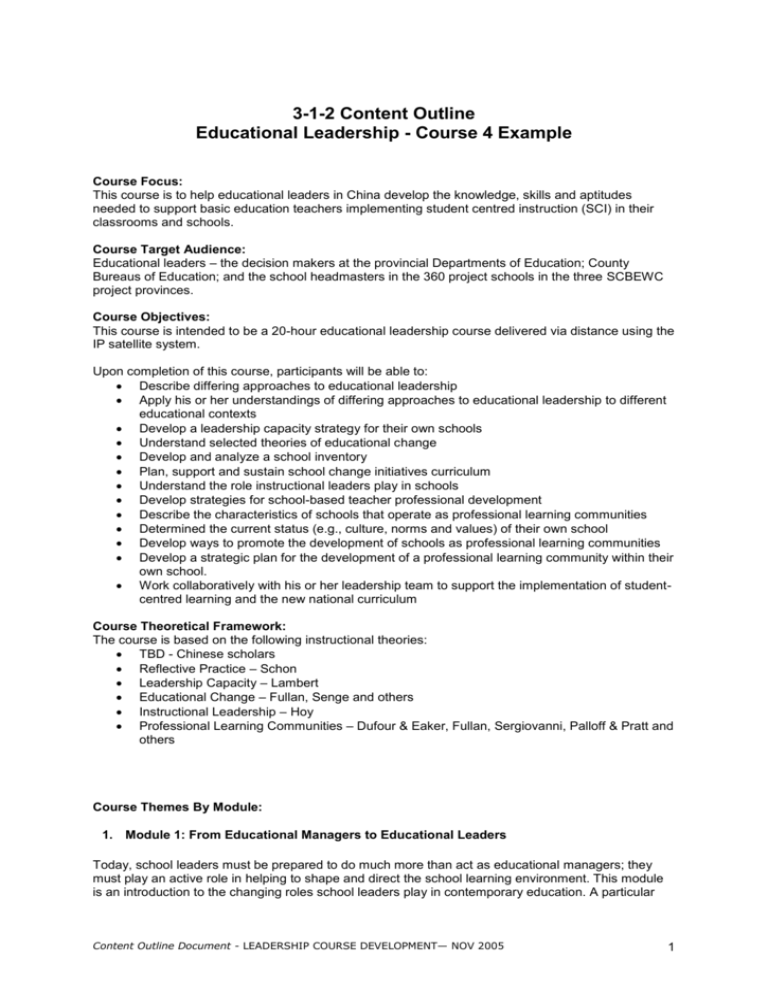
3-1-2 Content Outline Educational Leadership - Course 4 Example Course Focus: This course is to help educational leaders in China develop the knowledge, skills and aptitudes needed to support basic education teachers implementing student centred instruction (SCI) in their classrooms and schools. Course Target Audience: Educational leaders – the decision makers at the provincial Departments of Education; County Bureaus of Education; and the school headmasters in the 360 project schools in the three SCBEWC project provinces. Course Objectives: This course is intended to be a 20-hour educational leadership course delivered via distance using the IP satellite system. Upon completion of this course, participants will be able to: Describe differing approaches to educational leadership Apply his or her understandings of differing approaches to educational leadership to different educational contexts Develop a leadership capacity strategy for their own schools Understand selected theories of educational change Develop and analyze a school inventory Plan, support and sustain school change initiatives curriculum Understand the role instructional leaders play in schools Develop strategies for school-based teacher professional development Describe the characteristics of schools that operate as professional learning communities Determined the current status (e.g., culture, norms and values) of their own school Develop ways to promote the development of schools as professional learning communities Develop a strategic plan for the development of a professional learning community within their own school. Work collaboratively with his or her leadership team to support the implementation of studentcentred learning and the new national curriculum Course Theoretical Framework: The course is based on the following instructional theories: TBD - Chinese scholars Reflective Practice – Schon Leadership Capacity – Lambert Educational Change – Fullan, Senge and others Instructional Leadership – Hoy Professional Learning Communities – Dufour & Eaker, Fullan, Sergiovanni, Palloff & Pratt and others Course Themes By Module: 1. Module 1: From Educational Managers to Educational Leaders Today, school leaders must be prepared to do much more than act as educational managers; they must play an active role in helping to shape and direct the school learning environment. This module is an introduction to the changing roles school leaders play in contemporary education. A particular Content Outline Document - LEADERSHIP COURSE DEVELOPMENT— NOV 2005 1 focus of the module is on how school leaders can shift from being educational managers to being educational leaders. Topics covered include: Examining the historical background to contemporary understandings of school leadership Investigating different leadership styles: the difference between school management and school leadership Identifying the characteristics of effective school leadership Shaping the learning environment 2. Module 2: The Headmaster as Change Agent In the last two decades, the pace of educational change has dramatically accelerated. On-going curriculum and pedagogical reform, the introduction of new instructional technologies and the shift towards the creation professional learning communities has meant that school leaders are increasingly seen as change agents in schools. This module examines the different ways that educational leaders can act to initiate, support and sustain change within schools. A particular focus of the module will be on the important role headmaster’s play in implementing the new national curriculum. Investigating theories of educational change Developing a school inventory as a first step to implementing curriculum change Planning for curriculum change Supporting and sustaining curriculum change Measuring the impact of curriculum change 3. Module 3: The Headmaster as Instructional Leader Recent changes in how we understand the learning process have significantly affected the roles headmasters now play in schools. For example, an emphasis on student-centred instruction has meant that headmasters must act as instructional leaders so that they are able to help teachers develop the new pedagogical relationships that student-centred instruction demands. This module examines how school leaders can promote effective teaching and learning within their schools. A particular focus of the module will be on the role educational leaders play in supporting the in-service professional development of teachers as they implement student-centred instruction and on how educational leaders can act as resource people to support the delivery of distance education courses and resources. Reviewing the principles of student-centred instruction (SCI) Developing strategies for supporting school-based teacher professional development Mentoring teachers as they implement student-centred instruction Monitoring the implementation of student-centred instruction Developing strategies for supporting the delivery of distance education courses and resources 4. Module 4: The Role of the Headmaster in Developing Professional Learning Communities Today, schools are increasingly seen as professional learning communities in which students, teachers, administrators, parents and the wider community are connected by shared values and a mutual commitment to education. Because of this changed understanding of the nature of schools, headmasters have an important role to play as leaders of professional learning communities. This module will examine the role school leaders play in developing professional learning communities in schools. A particular focus of the module will be on how educational leaders can build and sustain professional learning communities in their schools. Understanding the concept of professional learning communities Linking professional learning communities to teacher professional development Developing strategies for building in-school professional learning communities Supporting and sustaining in-school professional learning communities Content Outline Document - LEADERSHIP COURSE DEVELOPMENT— NOV 2005 2





